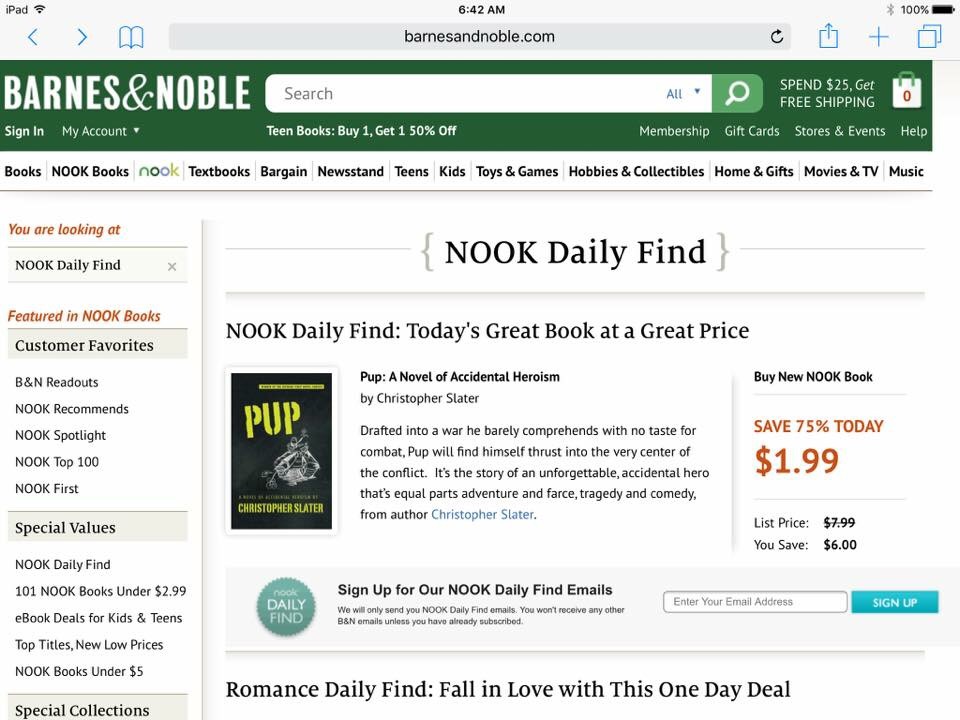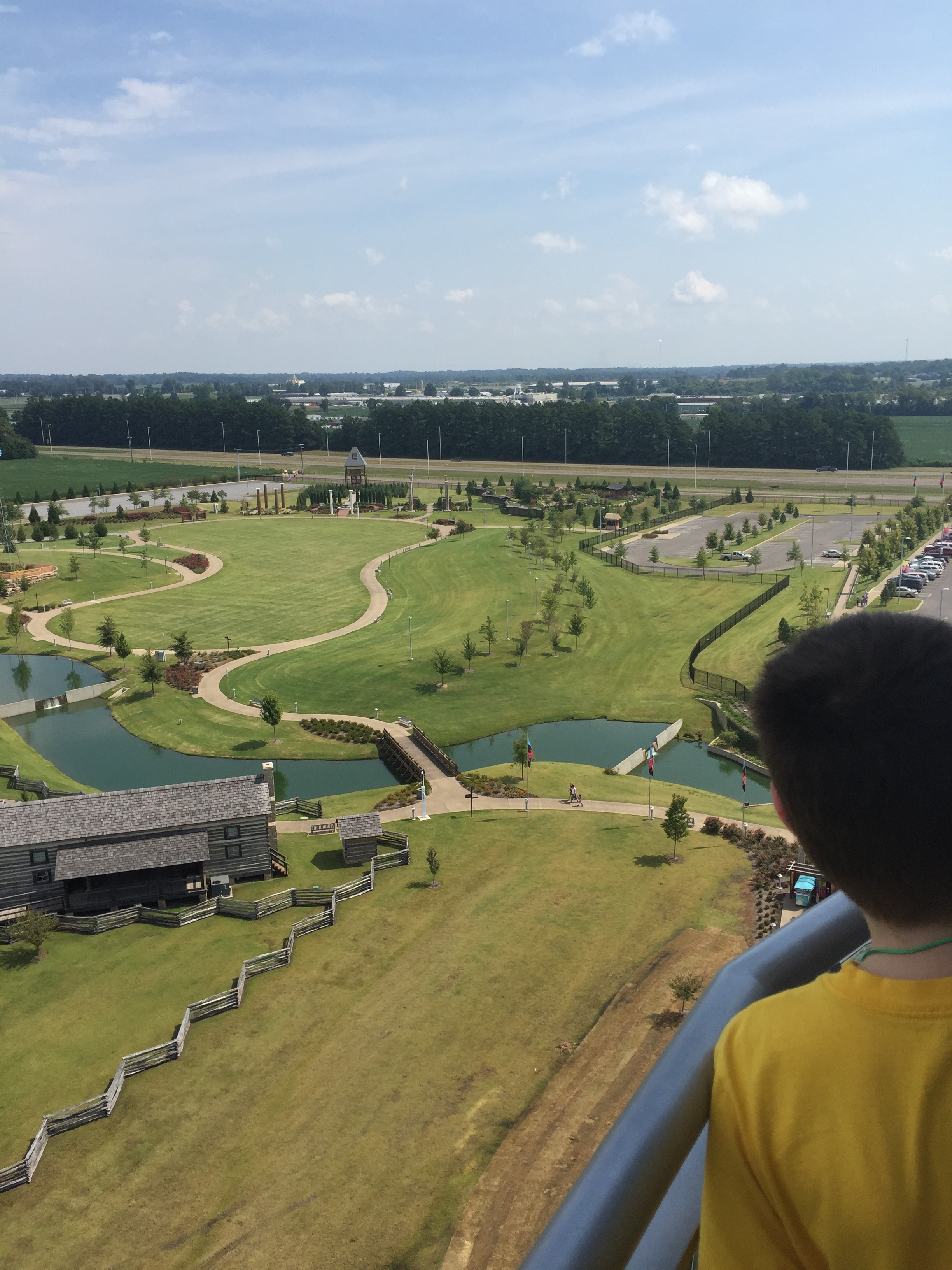This week has been pretty hectic, so today I just uploaded a vlog to tell you what I've been up to, what I hope to be up to, and a thanks for all of those that have been there for me as this opportunity to write has emerged. [youtube https://www.youtube.com/watch?v=0wVJnuyG6sE]
A quick plug
This isn't a normal blog entry, but I had to put this out there: my novel, PUP, is the NOOK Daily Find at www.barnesandnoble.com today! You can get an e-book version of the novel for just $1.99 today. If you need something to make you laugh, cry, or shake your head in amazement, it is a great purchase. Pass it on!

A good place to start
I remember trying to start my first novel when I was younger. It was unbelievably overwhelming. Coming up with a story idea was easy. Trying to come up with all of the characters, setting up the universe in which the story takes place, giving background, and all of the other details just seemed like more than I could handle at the time. If this seems to be your situation, I have an idea for something that can get you started on your road to developing your skills as a writer. That's this week's vlog topic. [youtube https://www.youtube.com/watch?v=d1Twi0SsDVU]
Autism in writing
This week I was thinking about...well, a lot more serious subjects than maybe I should during the holiday season. Regardless, I realized that there is a growing segment of the population that is often not included in writing as well as television and movies. We are doing that segment and ourselves a disservice by not including characters that truly represent them.. Of course I haven't really included these characters either (at least not on purpose), so I am going back in my work-in-progress and changing that. You may want to consider that as well.[youtube https://www.youtube.com/watch?v=lMkSqT0eL9o]
Back to some basics
I was working with some students in the creative writing class I sometimes teach, and I asked them to write a family story. Some of the most enjoyable stories that I tell are about family members and family events, and I wanted to have the students try the same thing. I have only gotten to hear a couple of the stories, but I noticed something in the ones that I did hear that got me to thinking about many of the things that I have read and why some of those things haven't grabbed me the way that other stories have: some writers have forgotten one of the basic lessons about a story. I'm sure that many of you have drudged your way through English class because you had to. Even writers have to push themselves through it sometimes. Don't take offense, English teachers. It is true of every class. I teach history and I had to drag myself through several history classes. However, there is a lesson from the class that we shouldn't forget, and that was the basic outline of a story. There should be an introduction, there should be conflict, there should be a climax, and then the resolution and conclusion of the story. This sounds pretty obvious, but you would be surprised at how often this doesn't happen.
There are all sorts of reasons why writers might not use this formula. Perhaps they are trying a new approach and see the novelty as a form of artistic expression. Maybe they are writing non-fiction and don't think that there should be a climax to it. Perhaps they didn't really look at the story after they wrote it, but instead recorded as almost a free flow of thought. Whatever the reason, I see this happen, and most of the time it doesn't work. Artistic expression only works if others can understand what you are doing and why. Don't get me wrong. I still like to see people experiment, but if I can't figure out their goal at the end, I may not give their next work a try. Unless you are writing a reference book, a non-fiction story still needs to captivate its audience, and having a climax helps to do that. Free flow of thought can work, but most of the time an audience wants to have that buildup of anticipation that leads to the climax. Otherwise, it's like listening to that relative that loves to pull you aside to tell you things at the holiday gathering but never seems to get to the point.
Long story short, go back to the basics. Look at your writing and see if, in some way, it follows the traditional model. You have to have that anticipation, and you have to have that climax. It's like the shiny object that grabs everyone's attention and says "Look at me! Shiny object! I'm a shiny object!" We know how well those work in real life. Why shouldn't they work in our writing?
Publication and Rejection
If you are an aspiring writer, there comes a point where you have to put up your "pen" (or your keyboard in most cases) and finally send the work that you poured your heart and soul into so that you can find an agent or a publisher. Once you do, what can you expect? I might not have the most experience in this area, but I figure I can offer a little bit of a preview for what you can do when you receive your reply.[youtube https://www.youtube.com/watch?v=z3wcvijAXks]
Being a writer's wife (my wife's perspective)
This week I asked my wife if she would talk a little bit about what it is like to be the wife of an amateur writer. We don't often consider what difficulties might be faced by a spouse when the writer is researching or writing or editing or brainstorming, etc. So here is her perspective on things. [youtube https://www.youtube.com/watch?v=G9Pbpr-OJIo]
There is more to it than writing
I've been pretty busy so my blogging, vlogging, and everything other than work and parenting has had to take a back seat for the past few weeks. However, I had the chance to throw together a vlog today and I'm talking about a skill that writers need to develop in order to be a successful writer. That skill is salesmanship. Are any of you good salespeople? How do you do it? I haven't figured out that talent yet, but I know the necessity of it. Any tips?[youtube https://www.youtube.com/watch?v=6Nc5EGmTh-c]
The most forgotten character
I have had one unbelievable week. On top of meetings or appointments after work every day this week, neither my wife nor myself have been feeling great. However, most disruptive of all has been the fact that my dog has been ill. It has caused lots of problems, but lots of concern as well. It got me to thinking about a character that is oftentimes not included in stories, and it really should be. The most forgotten character can be the one that makes your main characters have more depth. That is the topic for this week's vlog.[youtube https://www.youtube.com/watch?v=WR12YuzEN54]
Don't be afraid of your image. Or maybe you should be.
The start of the school year brings about a lot of changes for me. I have much less time for blogging, vlogging, writing, critiquing, etc. That time gets taken up by grading, lesson planning, research, preparation, and helping my own child with his homework. Despite this, it can wind up being a remarkably insightful time for me as a writer. My interaction with students and faculty bring me lots of new ideas and concepts for stories, characters, and even life in general. This week had me realize something that I used to think was limited to just teenagers, but I believe that it impacts writers a lot as well: we compromise to protect a certain image.One of the most frustrating thing that a teacher experiences is when we know that a student is intelligent and capable, but they will not take advantage of their abilities. I see this a lot in my creative writing lessons because they are not part of a graded course, so students are less inclined to put forth the effort. I always have a few students that do not want to put the thought into an assignment or answer that they could. They are capable, but they are oftentimes concerned about their reputation. They are afraid that if they show that they can be thoughtful and creative that it might ruin their image of being a class clown or that others might think that they are a nerd. It has held back some great talent, and it is a frustrating trait that I thought might exist only in middle school. I was wrong.
Writers are often writers by hobby more than by profession. This creates a situation very similar to that of middle school students. You have a professional reputation to protect, and knowing that someone might connect your writing with your profession may force you to compromise some of your ideas or plans for your story. I have been guilty of this on many occasions. The question is, should it? In an ideal world, a writer should be able to express their ideas without their art impacting their professional image. Of course, I don't have to tell anyone that we do not live in an ideal world. I am not talking about extreme cases here. I am talking about language used in the writing or perhaps some character traits. So where do you draw the line? Where do you decide that you need to compromise your art in order to protect your professionalism? Should you even consider such a thing? My thoughts on this depend upon your profession. Some professions and employers don't care if you write a book with some foul language and some unsavory characters. There is little connection with your profession and your hobby. In that case, don't compromise if you can avoid it. Other professions have little separation. What you do at any time is seen as a reflection of you as a professional. When that is the case, it is time to compromise, and keep that in mind as you write.
I am certain that several people just said some of those words that I am would recommend avoiding in some people's writing. I'm sure that the word "sellout" is flashing through several people's minds. First of all, I am writing this for amateur authors, not professionals. If you are an amateur, you have to worry about keeping food on the table. Practicality has to rear its ugly head now and again. Secondly, compromising some of your ideas can lead to a better final product. If you force yourself to rethink your approach to your story, you will often come up with some ideas that you wouldn't have even considered before when you were hooked on your original idea. Being forced to compromise can be a bridge to new approaches and a better final product. Life isn't always fair, but that doesn't mean that it can't be fruitful!
Audiobook giveaway!
Guess what! "Pup: A Novel of Accidental Heroism" is now an audiobook! I listened to it and have to say that it is a unique experience to hear your story being told in someone else's voice. To top it off, the narrator did a great job. I would love for some of you to experience this story being told with such a great voice, so I've arranged a little giveaway! Promo codes for a free copy of "Pup" on Audible will be given to three lucky winners. You can enter one of two ways. Use the rafflecopter widget below to enter. Best of luck to you!
a Rafflecopter giveaway //widget-prime.rafflecopter.com/launch.js
What are we waiting to write for?
This weekend my family and I took a short trip to a museum in west Tennessee. Part of the museum includes a tower that allows you to look out over a fairly impressive distance. I've been suffering from sinus problems lately, so my main thoughts while I was in the tower dealt with how dizzy I felt while that high up. Once we returned home, I got the chance to look at the pictures I had taken while up there and appreciate them without equilibrium issues. I loved them. Maybe I'm easily impressed, which is likely, but I looked at these pictures and realized that there is so much there that could be written about. Between the museum's outdoor exhibits and the surrounding landscape, it was a beautiful sight, and I realized how much people have a responsibility to share that beauty with the rest of the world. Some do it through art. Some pass it on one person at a time through their charisma and ability to share experiences. I try to pass on the history and beauty to each class full of students that passes through my room. As writers, we should be sharing it through our prose. Take a look at the pictures, or take a look around you. The world is there, just waiting to be shared with those that might not be standing by your side. Give them something to amaze them. If you can't show them a picture taken through a camera, paint them a picture created by your words. If you are facing some writer's block right now, look around you and ask, "What am I waiting for?"




*Thanks to Discover Park of America for the great experience*
Love is in the air...in every story!
This week I put together a vlog asking questions about romance in stories. Ever notice how most stories do have a romantic interest involved? It's like we can't escape it, regardless of what the topic is. So is it necessary? If you are adding a romantic interest into your story, how do you do it correctly? Well, take a look and let me know what you think![youtube https://www.youtube.com/watch?v=_0Tk2Dq_vmw]
Time period settings
This week I look at time periods. Are they important? Is there anything that you should know if you are trying to set things into a different time period? Future, past, or present? When do you like to set your writing? [youtube https://www.youtube.com/watch?v=mwa2HyIvevU]
Short story ideas and where to get them
In this week's vlog I talk about short stories, why they can be useful, and where to get ideas from. I mention a few ideas and would love to hear some of your own writing prompts. I plan on posting more prompts later this week.[youtube https://www.youtube.com/watch?v=jUFUnLbV2yg]
What are good reason to write? What are some not so good reasons?
I'm sure that many of you have thought about why it is that you like to write in whatever form that you write in. Of course, you have to ask yourself if it is a good reason. Obviously no one else can judge that but you, but can you say that your reason helps your writing? Does it add a passion, a heart to what you are doing? Sure, most of us had our first experience with writing as a result of a school assignment, and doing the writing as an assignment isn't always going to produce your best work, but when you write voluntarily, what is motivating you? That is the question that I ask on this weeks vlog. Take a look![youtube https://www.youtube.com/watch?v=1gFn9hr3BDA]
When you should add background to your story and how much
Just the other day I was watching a movie with my wife. I thought that the movie had potential, but I kept getting really confused during a good portion of it. Terminology, technology, concepts, and relationships that I didn't understand or had never heard of kept popping up. I was getting lost in trying to figure out some of the minutiae instead of enjoying the storyline of the film. This is a problem that I have begun to see in movies as well as in books. The writers don't seem to want to give any background early in the story. So when should you and how much should you give? There are some times when giving the back-story is part of the story itself. You don't always want to tell everything up front. Instead, you want to have it divided out because it helps to drive the story. That can work out wonderfully. The youth novel Holes wouldn't have been nearly as good if the entire background of the main characters was given in the beginning. It became a driving force in the storyline. If that is how you plan to have your story flow, go right ahead. However, make certain that you are dealing with characters, situations, and terminology that is familiar to the average person. You do not need your reader to get bogged down in trying to figure out what on earth you are talking about because you are using unique terminology. I will admit to having closed books and turned off movies because I wasn't able to figure out what they were talking about. If telling the background isn't a driving force in your story, then I would suggest getting that background out there as soon as possible. Your reader wants to know whose lives they are following or what situation they are watching unfold. Even Star Wars gave enough background to understand that there was a civil war taking place and that the Rebels were desperately trying to find some advantage to use against the much larger and stronger Empire. If you can't learn from Star Wars, who can you learn from?
The next thing that I find useful to point out as part of the background is enough information to educate your reader. A very dangerous trap that I have seen many writers fall into is that they assume that the person reading their book has a similar education to themselves. I'm not talking about college degrees here. I am referring to practical experience that impacts the terminology that you use or the processes that you might choose to not explain because you are so accustomed to them yourself. The safest bet is to never assume that your reader is familiar with what you are talking about. Just because a reader has chosen a military adventure doesn't mean that they know the difference between a carbine and a lmg. Just because someone chooses to read a legal thriller doesn't mean that they know what an indictment is (a large number of people don't). Some writers are concerned that they might make their audience think that they are stupid if they explain everything. If that is your concern, then have an ignorant character. Very often the people involved in different situations have no experience with whatever is going on. Let the character ask the questions that the audience might have. The audience doesn't get lost and you have a new, useful character for your story.
Be imaginative. Create your own stories. Create your own people. Create your own universe. Just remember that your readers, your audience cannot see into your imagination. You have to use your talent for story telling to draw them into your imagination. It's what some of the greatest stories do.
How binge watching might help your writing
I know that as a writer I should tell other writers that the only way to help your writing is to read, then write, then repeat the cycle to improve. There is a reason that formula is used so often: it works. However, we are in a changing time with new technologies and possibilities around every corner, so I would like to entertain new concepts that could open your mind to new possibilities. In today's vlog, I point out that the new public fad of binge watching can actually help you to develop your story and characters. It is all about opening your mind to new possibilities and stimuli.[youtube https://www.youtube.com/watch?v=Ev3opezTXLY]
How to make your villain believable
So you are writing your story and your antagonist does something cruel. Have you ever wondered if your audience believes that someone would do such a thing? It's amazing how many writers create a "bad guy" who is simply...bad. Sometimes it takes a great story and makes it mediocre. The way to prevent that is remarkably simple, and I tackle that not-so-secret in this week's vlog.[youtube https://www.youtube.com/watch?v=T3FNABNbeUs]
Happy Birthday to Pup
 Well, today is the day. My brain-child was finally born. The novel Pup has been released. There are certainly days that have been more important in my life. The birth of my son and my wedding day are the obvious ones that come to mind. Still, this one certainly ranks up there. Any of you that are writers understand how amazing it can be to watch a story take shape in your mind and by your hands. Sometimes the characters become as real, or sometimes even more real than the people around you.You go back to read through what you have written and you find yourself surprised with what you find. A life plays out before your very eyes. You get to not only witness it, but you also get to shape it. I feel sad to say this as a writer, but words cannot do justice to the process. Those of you that don't write understand as well. You get the same feeling through the expression of your own passions. I watched that same elation form on someone's face when they finally got a troublesome engine running once again. I see it when people draw, and I've seen it on the face of every person that finishes a long-distance race. It is an amazing journey.
Well, today is the day. My brain-child was finally born. The novel Pup has been released. There are certainly days that have been more important in my life. The birth of my son and my wedding day are the obvious ones that come to mind. Still, this one certainly ranks up there. Any of you that are writers understand how amazing it can be to watch a story take shape in your mind and by your hands. Sometimes the characters become as real, or sometimes even more real than the people around you.You go back to read through what you have written and you find yourself surprised with what you find. A life plays out before your very eyes. You get to not only witness it, but you also get to shape it. I feel sad to say this as a writer, but words cannot do justice to the process. Those of you that don't write understand as well. You get the same feeling through the expression of your own passions. I watched that same elation form on someone's face when they finally got a troublesome engine running once again. I see it when people draw, and I've seen it on the face of every person that finishes a long-distance race. It is an amazing journey.
The difference between this journey in writing and others that I have taken is that this one included another leg to the trip. Not only did I get to write the story, I was offered the privilege of publishing the story. This meant that my story would not only mean something to me, but it had the chance of finding meaning for someone else as well. No artist paints a picture hoping that they are the only one that sees it. The very knowledge that someone else, even if it is only one individual, would get a smile, a laugh, or a lesson from my writing was a heady feeling indeed. That feeling has lasted since I first heard the news about publication over six months ago.
So, the big day of release is finally here. So what am I planning to do to celebrate it. Nothing much. Honestly, I have kept up with my social media, spoken to my mom (she was probably one of the first buyers. No surprise there!), gone to a few shops, and gotten a little exercise. My wife and I will probably go out to eat, but that is all that I really have planned. Am I a party pooper? I don't think so. I've had six months of celebrating, and that isn't counting the writing process itself. I'm thrilled. I'm proud. I plan for a great showing. But I don't intend to spike the football. I'm happy just soaking it in and getting ready for the next day.
















